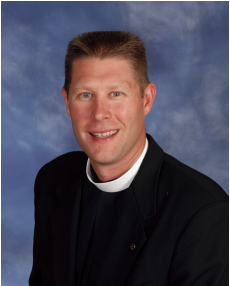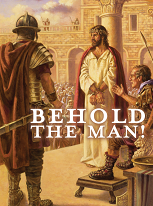Alleluia! Christ is Risen!
 He said to them, “Do not be alarmed. You seek Jesus of Nazareth, who was crucified. He has risen; he is not here. See the place where they laid him. But go, tell his disciples and Peter that he is going before you to Galilee. There you will see him, just as he told you.” Mark 16:6-7
He said to them, “Do not be alarmed. You seek Jesus of Nazareth, who was crucified. He has risen; he is not here. See the place where they laid him. But go, tell his disciples and Peter that he is going before you to Galilee. There you will see him, just as he told you.” Mark 16:6-7Alleluia! Amen.
The women were alarmed and afraid. Who could blame them? They had witnessed the disturbing events of our Lord’s Passion: betrayal, whipping, scourging, physical exhaustion, dehydration and excruciating capital punishment in the form of Roman crucifixion. Their family member, friend, Master and Lord had experienced all of this and was now stone-cold-buried-in-the-ground dead. But . . .
You have likewise witnessed trauma of varying degrees in your life. Perhaps you are experiencing it now. It leaves an ache, a void, a pain that no words could ever express. And perhaps like the women at the tomb, you hear the precious Good News that Christ is yet alive! But like the women, you are still seized by trembling and astonishment who even after hearing such remarkable hope and joy-filled words . . . said nothing to anyone, for they were afraid.
I often find that the hardest truth for Christians to accept is that death (physical) and life (spiritual) go together. Pain and pleasure. Sorrow and joy. Sinner and saint. Law and Gospel. Confession and Absolution. Water and the Word. Bread and Body. Wine and Blood.
My mother likes to sing. She would wake us up in the morning with silly songs that she made up on her own. She would sing old radio and TV commercials from her childhood. She would sing hymns and spiritual songs. It was often annoying! But regardless of the current events in a busy and tumultuous household, she found some way to strike a balance. Her faith in Christ was and is her one true joy. And so I now annoy my own children from time to time!
We sinners need balance. We need some way and means of truly dealing and wrapping our head around the events of our life.
Christ is your balance. Silly songs and other such things have their place in our day to day lives, but they are but a result of what and who our faith grasps and hold dear. Ultimately, in the grand scale of death and life, our Savior is the only way to strike a balance and forge a path forward.
Consider Pastor Apostle Paul, who in the introduction of his first letter to the Corinthians says this: we preach Christ crucified. That’s all about death, pain, sorrow and sin! But yet later in the same letter he says: if Christ has not been raised, then our preaching is in vain and your faith is in vain. These are seemingly two completely different things! Death and resurrection. But in Christ, they are one. For you.
“Our hope comes from God. May He fill you with joy and peace because of your trust in Him. May your hope grow stronger by the power of the Holy Spirit.” Romans 15:13
The women at the tomb did not yet grasp this or even possess such a balance. But Jesus keeps His word. He appears to them in Galilee, showing forth His resurrected body and even eating food with them to prove His yet intact divine and human nature. Marvelous!
If this Easter season finds you and your household in a good place, thanks be to God. If this Easter season finds you yet struggling with trembling and astonishment, thanks be to God. For your Lord yet comes to you! This is the heart of our Divine Services, every Sunday morning, where we gather on the weekly day of His resurrection. It is here that He meets us poor sinners. It is here that He brings joy and encouragement. “I forgive you” He speaks to you. “Peace be with you” He says through the mouth of your pastors. Through His Holy Gospel He comes and even stands among you and speaks to you in our Gospel Processional. “Take and eat, take and drink” He says of the bread and wine now also His body and blood . . . for the forgiveness of your sins.
He also continues to go ahead of us, preparing a place in heaven and the resurrection of our very bodies yet to come. So bring your alarm, your fear, your worries and your very sin and gather with others who confess such a simple truth, even in the midst of such a culture that calls such a faith “folly” and nonsense. He who was dead is now alive! And so shall it be for us. For He comes to be with us in Word & Sacrament. There you will see Him, just as He told you. Even still today. For you.
Alleluia! Christ is risen! He is risen indeed! Alleluia! Amen.
Pr. Mackay
P.S. Ponder once more the depth of this simple words sung by our women here at Advent as we began our Easter celebration at the early service in the dark. Marvelous.
Christ is Arisen Christ ist Erstanden (c. 1100)
Christ is arisen from the grave’s dark prison.
So let our joy rise full and free;
Christ our comfort true will be.
Alleluia!
Were Christ not arisen, then death were still our prison.
Now, with Him to life restored,
We praise the Father of our Lord.
Alleluia!
Alleluia, alleluia!
Now let our joy rise full and free;
Christ our comfort true will be.
Alleluia!
He was reviled.
 23 When he was reviled, he did not revile in return; when he suffered, he did not threaten, but continued entrusting himself to him who judges justly. 1 Peter 2:23
23 When he was reviled, he did not revile in return; when he suffered, he did not threaten, but continued entrusting himself to him who judges justly. 1 Peter 2:23
Behold the man! I pray that our Lenten devotions have been a blessing to you and your family as we have begun our 40 day journey (not counting Sundays, where we breakfast (break the fast) and receive what we poor sinners truly do not deserve in our Lord’s Body and Blood: forgiveness of sins, life and salvation.
“Lent” literally means “spring”, derived from an Old English word. This is somewhat fitting, as this penitential season generally takes place in the Spring of the new year (but how well we know that it seems more like the latter part of winter) 🙂 This is especially true with an early date of Easter, which is always celebrated in the Spring. Regardless, Spring presents us with new life, growth and a changing of habits.
And think of the habits that need changing! Lent is thus a penitential season, a time of repentance, a turning away from sin which clings so closely . . . a changing of habits!
There needs to be a changing of habits in the Mackay household, how about yours? My wife and I have noticed an increase of “reviling” amongst our boys. Revile means to criticize in an abusive or angrily insulting manner (dictionary.com). We have noticed that they often speak in such a way to each other and we have taken steps to change these bad habits! Sure, boys will be boys and a competitive nature and even good natured ribbing and such is part of growing and finding one’s way in the world. But how quickly it can turn to reviling!
Think of what we hear and read on social media, the news networks, TV and streaming programs! Reviling of our elected authorities, celebrities, parents and friends. I would humbly submit to you that this is a very specific area in which the devil, the world and our sinful nature is currently attacking.
Paul warns the Thessalonian Christians about this:
9 For God has not destined us for wrath, but to obtain salvation through our Lord Jesus Christ,10 who died for us so that whether we are awake or asleep we might live with him.
11 Therefore encourage one another and build one another up, just as you are doing.
This should also remind you of the Eighth Commandment and Luther’s apropos explanation:
You shall not give false testimony against your neighbor.
What does this mean? We should fear and love God so that we do not tell lies about our neighbor, betray him, slander him, or hurt his reputation, but defend him, speak well of him, and explain everything in the kindest way.
We sin daily and sin much when we revile others. We tell ourselves that because it is true, it is perfectly right to tell others our thoughts and opinions! This is sin. God calls us to protect our neighbor’s reputation! To speak well of them! To defend them in every possible way!
As Christians, we are called to be in the world but not of the world. We are called out of darkness and into the glorious light of Christ. Yes, let us debate and speak the truth, but let us be mindful of God’s command to respect our fellow man and his or her reputation. Let us learn how to be winsome and even silent. I can still hear my grandmother admonishing me: “if you don’t have anything nice to say . . . zip it.”
So let us repent. Let us change our habits and become mindful of what we say and how we say it. Let us look to Christ, the author and perfecter of our faith.
He did not revile. He did not threaten. He entrusted His entire body and soul . . . His reputation . . . into His Father’s hands. In doing so, He mercifully earned forgiveness for us poor gossiping and reviling sinners. Christ your Savior was reviled . . . for you. Behold the Man!
Repenting and changing habits with you,
Jesu Juva (Jesus help),
Pastor Mackay
Behold the Man!
 Ash Wednesday, March 6th, is the first day of the season of Lent. Lent is a time of prayer, repentance, and renewal.
Ash Wednesday, March 6th, is the first day of the season of Lent. Lent is a time of prayer, repentance, and renewal. - The ashes come from the Palms that were used for last year’s Palm Sunday service!
- Olive oil was commonly used in Jesus’ time to moisturize & protect the skin, in addition for the sacred use of “anointing”. Don’t worry, it will all come off with a little soap and water!

- Our focus this Lenten Season is “Behold the Man!” A devotional booklet is provided for each member household and located in your member mailbox. If you are a guest or visitor, we have one available for you free of charge! We will gather each Wednesday and “Behold the Man!” in a chronological reading and meditation of the Passion account. JOIN US FOR LENT AND EASTER SERVICES!
- Some people “give something up” for the Lenten season (which consists of 40 days, not counting Sundays, before Easter). You may do this if you wish, in order to help focus on the many gifts that God gives us. Fasting was common in OT & NT times and many still do so today (Jesus fasted in the desert). Ask one of the Pastors if you have questions or concerns!
Our theme and devotional booklet have been written by Rev. Jeff Hemmer and published by Concordia Publishing House. I leave you with these wise and winsome words from Pastor Hemmer:
Overheard at a local hardware store

Unto us a Child is born…
 It was Christmas of 1532. The Peace of Nuremberg had just been signed in June, halting conflict between the Catholics and Protestants and uniting them against the Ottoman Turks who were threatening Hungary. We know from history that this peace would not last. In August, the German Lutherans mourned the death of Elector Johann, who suffered a stroke while at his hunting castle. At his funeral service, Luther praised him for his courage in signing the Augsburg Confession back in 1530. Who would fill such large shoes? Regardless, surely all of these events and future concerns weighed heavily on Luther’s mind and heart!
It was Christmas of 1532. The Peace of Nuremberg had just been signed in June, halting conflict between the Catholics and Protestants and uniting them against the Ottoman Turks who were threatening Hungary. We know from history that this peace would not last. In August, the German Lutherans mourned the death of Elector Johann, who suffered a stroke while at his hunting castle. At his funeral service, Luther praised him for his courage in signing the Augsburg Confession back in 1530. Who would fill such large shoes? Regardless, surely all of these events and future concerns weighed heavily on Luther’s mind and heart!




